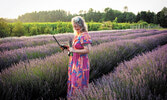James-Smith wins Organic Council award for pollinator preservation work
BY SCOTT STEPHENSON
Lavender has long been prized for its delicate purple blooms, soothing fragrance and calming properties. But humans aren’t the only ones who benefit from this hardy herb - just ask Gemma James-Smith, proprietor of Bayfield Lavender Farm. Her dedication to creating a thriving, chemical-free haven for pollinators and biodiversity has earned her the Organic Council of Ontario’s (OCO) 2025 Pollinator Protector Organic Champion Award.
On her small farm just outside Bayfield, James-Smith grows an abundance of lavender that, in her words, “pretty much takes care of itself.” Her primary crop may be a simple herb, but the vibrant ecosystem she has built around it is anything but. “A very important part of the whole dream for me is building gardens around the lavender that foster and help beneficial pollinators - birds, butterflies, bees, praying mantises, ladybugs - everybody who wants to help us out. By attracting those beneficial insects, it does a job for us, in terms of getting aphids eaten, or whatever needs to go away,” she explained to The Citizen. “Promoting and building a system here that helps itself means we don’t have to use herbicides or pesticides.”
Before moving to Huron County from Toronto almost 10 years ago, James-Smith never envisioned herself becoming a farmer. That all changed when she took up residence on a 10-acre farm with her family. It wasn’t long before fate intervened, changing the trajectory of her future forever. “I had a tiny little baby, and we moved onto this property - it was really beautiful and very overgrown. As I cleaned up the property, I came upon six very old lavender plants - they were so old that they had thick trunks,” she recalled. “I was really taken with the lavender when it bloomed that summer, so I decided to try harvesting it and doing a Christmas market. People really responded to it, and I loved doing it.”
From those six plants, James-Smith taught herself to propagate lavender, eventually accumulating nearly 1,000 plants. When the pandemic hit, she just kept on planting and, by 2023, she was ready to open her farm to visitors. “It just seemed natural to start inviting people to visit - [the plants are] meant to be looked at and shared,” she pointed out. Today, Bayfield Lavender Farm boasts a wide variety of personal care and culinary products, including lip balm, lavender-infused honey and naturally-scented candles.
While her farm isn’t formally certified organic, James-Smith works to follow organic principles in every aspect of her operation. “We don’t use herbicides or pesticides,” she assured The Citizen. “For an operation my size, getting certified organic doesn’t quite make sense - there’s a lot of cost involved. To keep our products at a reasonable price point, certification isn’t practical, but we follow organic principles and are very much committed to an organic way of farming.”
Though this is her first major connection to the OCO, James-Smith is excited to learn more about the organization. “This award is really my big introduction,” she said. “I’m looking forward to attending their conference in January, and just spending time with that community and learning more about it… they provide education and keep getting the word out about how people can help. They promote things like soil health, biodiversity and beneficial microbes - working with nature rather than against it. It’s an important organization because they have so much information and so many resources available.”
Soil health and biodiversity are central to James-Smith’s approach. “I’ve planted literally thousands of wildflowers around the property. When we amend the soil, we use composted goat and chicken manure from our animals… we’ve been able to amend things naturally, and it really helps with plant resilience in the long term,” she declared. “I’m very proud that we have this pocket of land that’s alive and finding its own harmony. I often think about it like listening - watching the lavender and learning what it likes and doesn’t like. There are ways of listening to the land around you in order to shape it. That’s where I’m at with this whole project - just excited to keep watching it evolve…. We saw a huge increase in monarchs this year on the farm. It’s better than TV! The gifts you get back are really healthy plants and ecosystems. That’s the biggest thrill!”
Looking to the future, James-Smith hopes traditional farmers and consumers will embrace organic farming techniques and products. “Money’s great, but having a planet to live on is also really cool,” she pointed out. “So it’s probably a good idea to keep an open mind and try new things.”
Being named a Pollinator Protector means a lot to this Toronto-transplant-turned Bayfield flower farmer. “I’m really touched. You can get recognition as a small business, but this means something more - because my business wouldn’t exist without my pollinators. I’m thrilled!…I’m one of those people who talks to the butterflies, talks to the bugs. I really feel connected to the whole environment around us,” she explained. “You can farm something without harming things. If you have to till or dig up a section, you can balance that out by planting trees or wildflowers. It’s about reciprocity - saying thank you to the land and the animals around you.”

